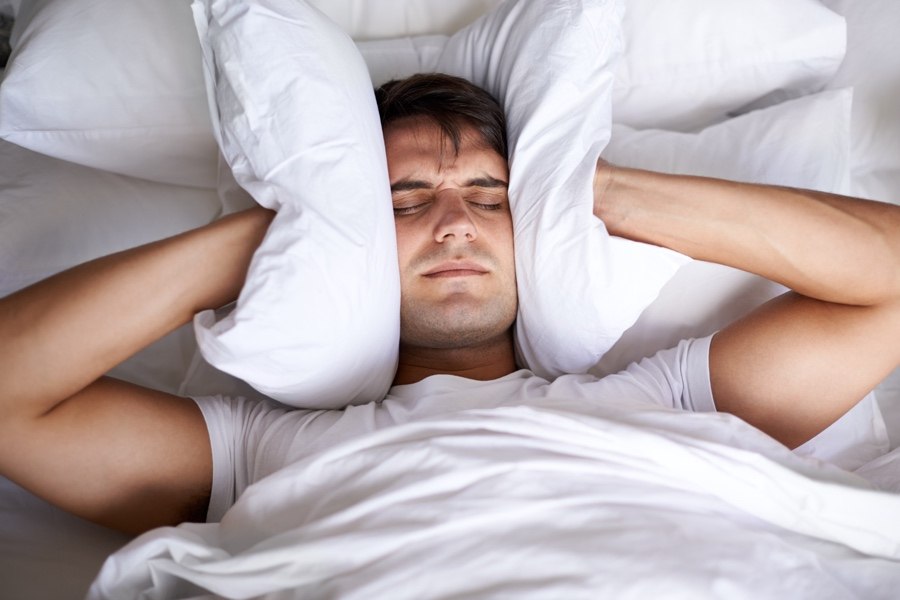Living Near the Airport Means You’ll Probably Wake up More in the Middle of the Night
And other insights into the effects of sound on sleep and health from Penn associate professor and noise researcher Mathias Basner.

Mathias Basner talks about the effects of noise on sleep and how to combat the issue. / Photograph courtesy of Getty Images
Amid the scourges of opioids and anti-vaxxers over the past few years has emerged a particularly grating public health issue: sound. Or, more aptly put, noise — the perpetual buzz of construction and traffic and data servers that causes many of us to sleep poorly and live at greater risk for health conditions ranging from high blood pressure to depression.
“Noise is the silent killer in the sense that it’s really a cumulative effect,” says Mathias Basner, an associate professor at the University of Pennsylvania School of Medicine. “If you expose yourself to high levels of noise, that won’t kill you. Our bodies are pretty amazing; we can tolerate a lot of things, especially with a one-time exposure. If it’s not extreme, we’ll deal with it. But if you’re exposed to high noise levels on a regular basis for prolonged periods of time, that’s when we pay the price — and humans are really bad at making that connection.”
Basner knows what he’s talking about: He’s been investigating the effects of sound, particularly related to sleep disruption, for decades, and the FAA is currently funding his research around the impact of aircraft noise exposure on sleep. Basner and his team completed the first part of that study right here in Philly, with a group of people living near Philadelphia International Airport, and recently published the results in the International Journal of Environmental Research and Public Health.
The main purpose of the local research was to test whether certain technology could provide accurate measurements, but the scientists also examined whether there was a difference in sleep patterns between those who can hear the din of planes taking off and landing while they’re trying to sleep and those who can’t.
This was a small study, so more work will need to be done to validate the findings. But Basner and his co-authors did observe that people who were exposed to a high level of aircraft noise in their bedrooms were more likely than the control group to wake up once they were asleep. More of these folks also “reported poorer sleep quality and poorer health than the control group in general,” according to the study. Yet, when comparing the same nights across all groups, there wasn’t a significant difference in sleep disruption. Blood pressure also didn’t seem to be affected by all the noise.
It will be a while before the full study, set to take place in multiple cities, is complete, but the FAA will eventually use the results to determine whether they need to tinker with noise regulations. Getting rid of noise problems isn’t as simple as changing the law, though. States set most noise level laws, so the FAA can’t just ban sound above a certain decibel in all situations. Plus, if there isn’t a way to enforce the law, it’s moot. (If only we had a PPA for sound.)
So why can’t you simply choose to live farther away from the airport or other noise disturbances? “Not everybody has the luxury of picking a nice and quiet home,” Basner says. “The noisier regions are often the more affordable ones. In that sense, we have a noise equity problem.”
Thinking outside the box seems to be the solution. Basner says other studies have revealed certain frequencies of noise that bother humans the most, so engineering engines and other noisy machines to change the frequency of the sounds they make could work. And, in many Philly neighborhoods, there might be a unique architectural solution: choosing to sleep in a room at the back of the house. “If you think of a block of houses [in some old areas], the front is facing the road, and the back is facing the backyard,” Basner says. “That may be a noise refuge. If you put the bedroom at the back of the house, you may have a wonderful night of sleep with no noise because the whole block of houses is shielding the rooms on the inside of the block relative to the road traffic noise on the outside.” Finally, a way to use our infrastructure for good.


